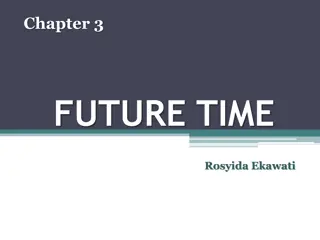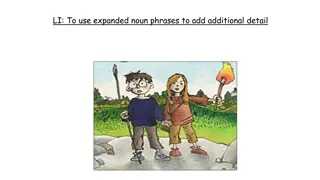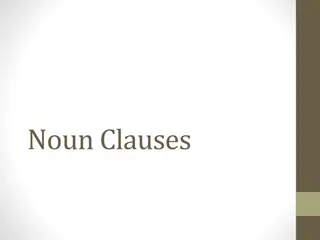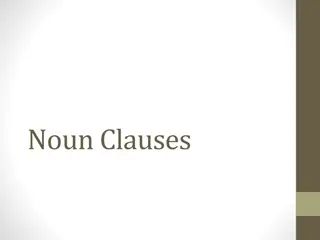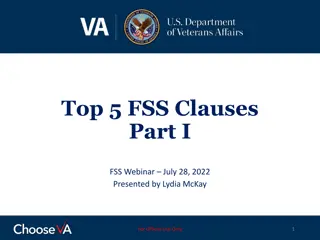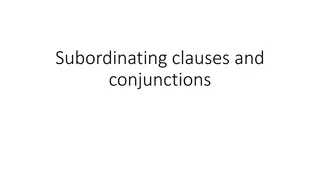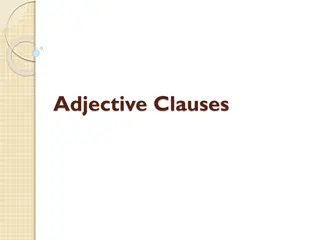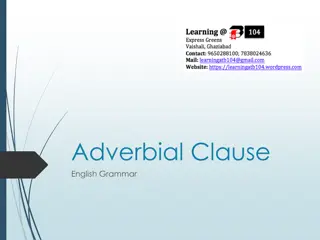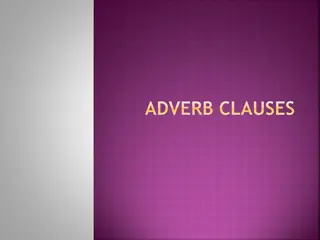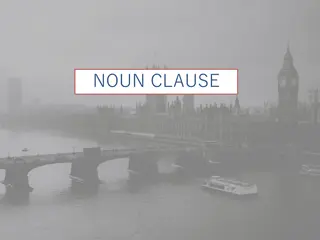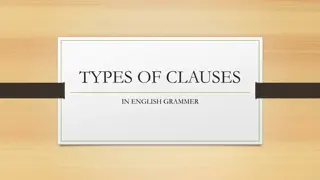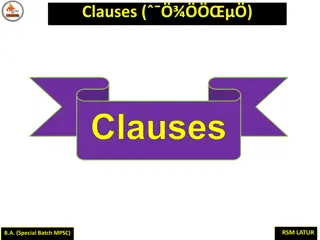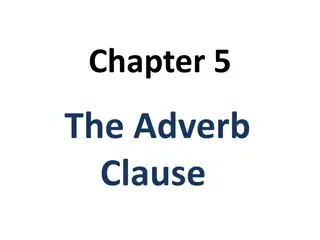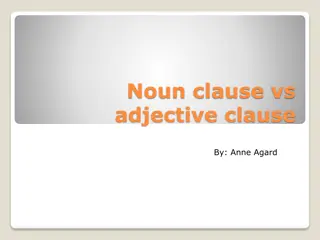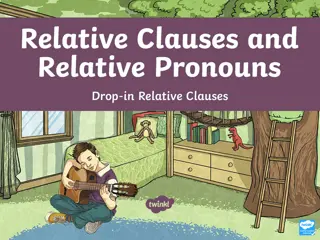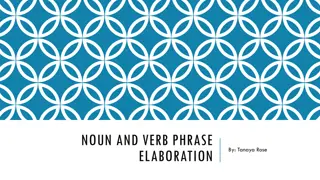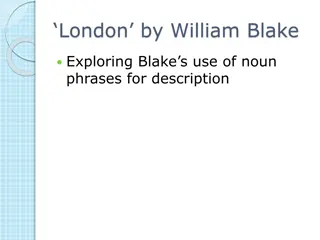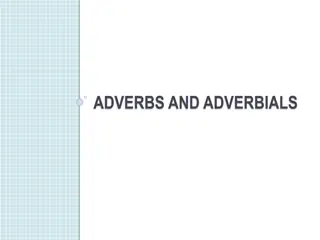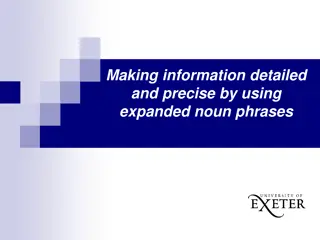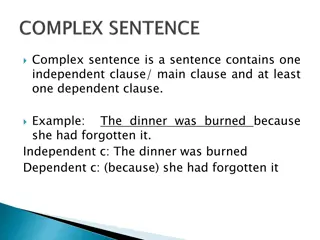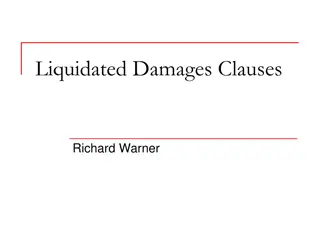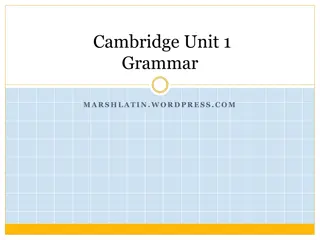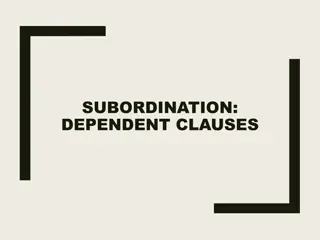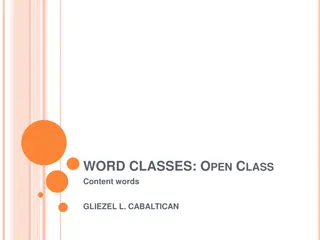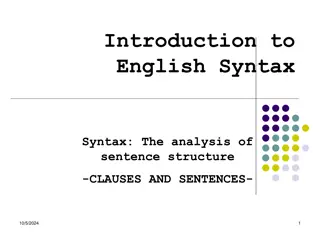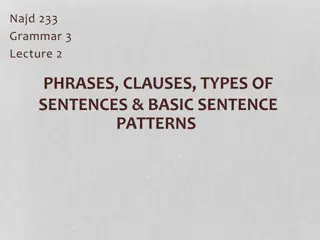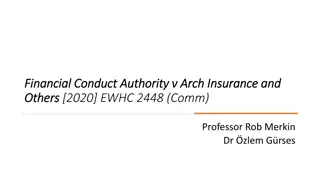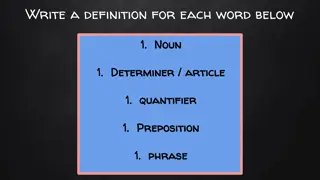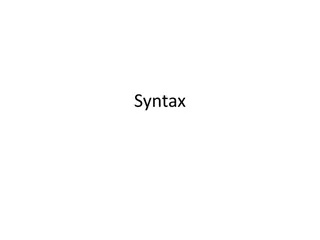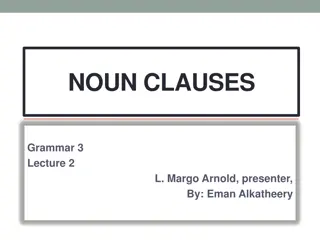Understanding Embedded Clauses in Writing
Explore the use of embedded clauses in writing through examples and practice exercises. Learn to identify main and subordinate clauses, conjunctions, and create sentences with fronted adverbials. Enhance your writing skills by understanding the structure and function of embedded clauses.
0 views • 12 slides
Understanding Phrases, Clauses, and Expressing Future in Time Clauses
Learn about the difference between phrases and clauses in sentences. Understand how clauses can be independent or dependent, and how time clauses are used to express future actions. Discover the rules around constructing time clauses and their significance in sentence structure.
5 views • 14 slides
Enhancing Descriptions with Expanded Noun Phrases
Learn how to transform simple noun phrases into detailed descriptions by adding adjectives to create expanded noun phrases. Explore examples and engage in an activity to practice using expanded noun phrases to describe characters effectively.
0 views • 6 slides
Understanding Noun Clauses: Examples and Usage
A clause is a group of words with a subject and a verb, while a phrase lacks a subject and verb. Noun clauses, which function as nouns, can be subjects, objects of verbs or prepositions, and complements. They often begin with question words like what, when, or why. Examples illustrate their usage in
2 views • 49 slides
Understanding Noun Clauses in English Grammar
A clause is a group of words with a subject and a verb, while a phrase lacks one. Independent clauses can stand alone, while dependent clauses cannot. Noun clauses function as nouns in a sentence, serving different roles like subjects, objects, prepositional objects, and complements. They can start
1 views • 49 slides
Understanding Top 5 FSS Clauses for Federal Supply Schedule Contracts
This training session delves into the crucial FSS contract clauses that impact compliance and management. Learn about key clauses like minimum contract sales criteria, cancellation authority, and trade agreements requirements. Discover how these clauses can affect offerors and contractors, guiding y
0 views • 39 slides
Understanding Subordinating Clauses and Conjunctions through Examples
Explore the concept of subordinating clauses and conjunctions by analyzing sentences with conjunctions like "when", "after", "if", "once", and more. The examples showcase how these clauses connect dependent and independent clauses to enhance sentence structure and meaning. Gain insights on using sub
1 views • 6 slides
Understanding Adjective Clauses in English Grammar
Adjective clauses, also known as relative clauses, are dependent clauses that act as adjectives in sentences. They modify nouns, pronouns, or entire sentences and begin with a relative pronoun. This article explains how adjective clauses function, provides examples, and discusses the use of pronouns
1 views • 62 slides
Understanding Noun Clauses in English Grammar
A clause is a group of words with a subject and verb, while a phrase lacks one. Noun clauses, functioning as nouns, serve various roles in sentences. They can be subjects, objects of verbs/prepositions, or complements. Starting with question words like what, when, or why, these clauses mirror statem
0 views • 49 slides
Understanding Adverbial Clauses in English Grammar
Adverbial clauses in English grammar serve as adverbs to modify verbs, providing information about time, place, cause, contrast, condition, purpose, result, and manner. By exploring the types of adverb clauses, subordinating conjunctions, and examples, you can enhance your understanding of how adver
0 views • 10 slides
Understanding Adverb Clauses: Usage and Examples
Adverb clauses help to establish relationships between ideas by indicating time, cause and effect, contrast, and condition. They are dependent clauses that must be connected to a main clause. Punctuation plays a key role in distinguishing between adverb clauses that precede or follow a main clause.
0 views • 43 slides
Understanding Noun Clauses and Their Functions
A clause is a group of words containing a subject and predicate forming part of a sentence. Noun clauses act as nouns in a sentence and can function in various ways, such as being the subject or object of a verb, participle, or preposition. They are identified by asking "who" or "what" questions and
0 views • 23 slides
Understanding Types of Clauses in English Grammar
A clause is a fundamental unit of a sentence, comprising a subject and predicate. Learning about the different types of clauses - Independent, Dependent, Relative, and Noun clauses - helps in enhancing grammar skills and sentence structure understanding. Independent clauses stand alone as complete s
1 views • 11 slides
Understanding Clauses and Their Types in English Grammar
This comprehensive guide explores different types of clauses in English grammar, including main clauses, subordinate clauses, independent clauses, adverb clauses, noun clauses, and adjective clauses. It delves into the functions of clauses as subjects, objects, complements of verbs, objects of prepo
2 views • 11 slides
Understanding Adverb Clauses: Types and Examples
Adverb clauses are dependent clauses that function as adverbs to modify the main clause's verb. They are connected by subordinating conjunctions and come in types like time, condition, cause, effect, and contrast. Adverb clauses of time detail when actions occur, while examples showcase how they mod
5 views • 7 slides
Understanding Adjective Clauses and Noun Clauses in English Grammar
Learn the key differences between adjective clauses and noun clauses in English grammar. Adjective clauses describe nouns, while noun clauses take the place of a noun in a sentence, serving as either the subject or object of a verb. Discover how to identify and use these clauses effectively through
0 views • 10 slides
Understanding Relative Clauses and Pronouns
Utilize relative clauses to provide additional information to a noun, using relative pronouns such as who, which, where, when, and whose. Learn how to construct complex sentences with at least two clauses, ensuring the subordinate clause complements the main clause. Explore examples and practical st
2 views • 14 slides
Understanding Grammatical Development in Speech-Language Pathology
Explore a broader perspective of grammatical development in speech-language pathology focusing on noun and verb phrase elaboration. Learn about identifying and elaborating noun phrases, substitution tests, and the elements of an elaborated noun phrase. Gain insights into clinical approaches and lang
0 views • 28 slides
Understanding Phrases, Clauses, and Sentence Structures in Grammar
Learn about phrases and clauses, differentiate between independent and dependent clauses, identify subordinate conjunctions, and practice annotating sentences for independent and dependent clauses. Improve your grammar knowledge with examples and guided practice exercises from Perry High School's Gr
2 views • 67 slides
Analysis of William Blake's Use of Noun Phrases in "London
Exploring William Blake's poem "London," this analysis focuses on the use of noun phrases to describe people, places, objects, and emotions. By examining the nouns chosen by Blake and the patterns they form, we gain insight into the vivid and evocative imagery he creates. The expanded noun phrases i
1 views • 4 slides
Understanding Adverbs and Adverbials in English Grammar
Adverbs modify various elements in a sentence, such as verbs, adjectives, and even whole clauses. Not all adverbs end in "ly," and they can belong to categories like time, place, degree, and discourse markers. Adverbials are strings of words that modify functions, including prepositional phrases, no
1 views • 9 slides
Enhancing Writing Through Detailed Noun Phrases
Explore the LEAD principles for connecting grammar with meaning and rhetorical effect in writing. Authentic texts are utilized to engage learners in deep metalinguistic learning. An interactive activity challenges readers to match descriptions with marine creatures based on detailed noun phrases. De
1 views • 6 slides
Understanding Clauses of Purpose in English Grammar
Clauses of purpose in English grammar are used to explain the reason behind an action or event. They can be introduced in various ways such as full infinitive, in order to, so as to, so that, among others. These clauses serve the purpose of clarifying the intentions or outcomes of a particular actio
3 views • 11 slides
Understanding Grammar: Clauses in Sentences
A clause is a fundamental part of a sentence that comprises a subject and a verb. A clause can either stand alone as a sentence or be dependent on a main clause. Independent clauses can function independently, while dependent clauses rely on main clauses for context. Examples and explanations help c
0 views • 28 slides
Understanding Clauses in English Language
This informative presentation delves into the concept of clauses in the English language, covering topics such as types of clauses (independent, subordinate, noun), definitions, examples, and how to combine sentences using clauses. Exploring the basics and intricacies of clauses can enhance your und
0 views • 17 slides
Understanding Complex Sentences and Clauses
Complex sentences consist of an independent clause and at least one dependent clause, such as adjective, adverb, or noun clauses. They are connected using subordinate conjunctions, relative pronouns, and relative adverbs. Each has a specific role in modifying nouns, pronouns, verbs, adverbs, or conn
0 views • 14 slides
Understanding Liquidated Damages Clauses in Contracts
Liquidated damages clauses serve to determine a precise amount of damages in case of contract breach when actual damages are difficult to ascertain. Courts enforce such clauses if they meet certain criteria based on reasonability and proportionality. Historical hostility towards these clauses has le
0 views • 17 slides
English Grammar Final Exam Review
Subordinate clauses, nominal phrases, and noun clauses are identified within the context of adjectival, adverbial, or nominal functions. The exercise covers recognizing nominal clauses following prepositions as noun phrases, pronouns, gerunds, or nominal clauses. Additionally, combining sentences us
0 views • 17 slides
Understanding Types of Sentences in English Grammar
Types of sentences in English grammar include clauses - independent and dependent. Independent clauses stand alone, expressing complete thoughts, while dependent clauses rely on independent clauses. Different types of sentences include simple, compound, complex, and compound/complex sentences. Simpl
0 views • 41 slides
Understanding Latin Noun Cases and Declensions
Explore the use and distinctions of Latin noun cases (Nominative, Genitive, Dative, Accusative, Ablative), along with the concept of declensions, genders, numbers, and cases. Learn how to determine the declension, gender, number, and case of a Latin noun through its endings, and delve into examples
0 views • 23 slides
Mastering Noun Phrases for Expertise in Language
Explore the power of crafting precise noun phrases to elevate your expertise on any topic. Unveil the secrets of using nouns strategically to convey depth and authority in your writing. Dive into the world of language detectives and uncover the nuances of language through the lens of noun phrases. E
0 views • 10 slides
Mastering Relative Clauses in Writing
Enhance your writing skills by mastering the use of relative clauses to draw inferences about characters' feelings, thoughts, and motives. Learn how to add extra information to sentences using relative clauses beginning with who, which, where, when, whose, that, or an omitted relative pronoun. Explo
0 views • 20 slides
Understanding Subordination in Grammar
Subordination in grammar involves dependent clauses that are not independent. These subordinate clauses play three main roles in a sentence: adverbial, adjectival, and nominal. Adverbial clauses provide information on time, manner, place, condition, reason, and purpose. Adjectival clauses act as mod
0 views • 26 slides
Understanding Word Classes and Noun Functions in Grammar
Explore the concept of word classes such as open class and minimum free form, structural vs traditional grammar, count abstract vs concrete nouns, noun phrase extensions, properties of nouns, and noun functions in language. Enhance your understanding of adjectives, determiners, prepositions, and var
0 views • 28 slides
Understanding English Syntax: Clauses and Sentences Analysis
Delve into the major properties of clauses, including finite verbs, mood distinctions, and descriptions of situations and participants. Explore compound and complex sentences with main and subordinate clauses, along with complement clauses in English syntax analysis.
0 views • 27 slides
Understanding Phrases, Clauses, and Sentence Types in Grammar
A phrase is a group of words within a clause that conveys meaning, such as noun phrases, verb phrases, adjective phrases, adverbial phrases, and prepositional phrases. Clauses are groups of words containing a subject and a verb, with independent and dependent clauses being the two main types. Indepe
0 views • 33 slides
Analysis of FCA v. Arch Insurance Case: COVID-19 Impact on Insurance Policies
The case of Financial Conduct Authority v. Arch Insurance highlights the legal implications of COVID-19 on insurance policies, focusing on trigger of cover clauses, relevant background regulations, objectivity principle in contractual construction, trends clauses, and the counterfactual assessment.
0 views • 23 slides
Understanding Noun Phrases: Definitions and Examples
Noun phrases are essential components of language that consist of a noun and other words that describe or modify it. This article provides definitions for key terms related to noun phrases, such as nouns, determiners, quantifiers, prepositions, adjectives, and adverbs. Examples and images help illus
0 views • 12 slides
Understanding Syntax in Linguistics
Words in a language are organized into phrases and clauses with specific syntactic categories like Noun Phrase, Verb Phrase, and Adjective Phrase. Each phrase has a head such as a noun, verb, or adjective, and phrase structure rules help diagram the syntactic structure. Clauses are the largest units
0 views • 20 slides
Understanding Noun Clauses in Grammar
Noun clauses are dependent clauses that act as nouns in sentences, serving as subjects, verb objects, prepositional objects, and complements. They should not be separated from main clauses with punctuation. Noun clauses can appear at the beginning of a sentence or after certain nouns, adjectives, an
0 views • 77 slides

